13 start with W start with W
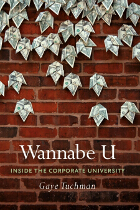
Based on years of observation at a large state university, Wannabe U tracks the dispiriting consequences of trading in traditional educational values for loyalty to the market. Aping their boardroom idols, the new corporate administrators at such universities wander from job to job and reductively view the students there as future workers in need of training. Obsessed with measurable successes, they stress auditing and accountability, which leads to policies of surveillance and control dubiously cloaked in the guise of scientific administration. In this eye-opening exposé of the modern university, Tuchman paints a candid portrait of the corporatization of higher education and its impact on students and faculty.
Like the best campus novelists, Tuchman entertains with her acidly witty observations of backstage power dynamics and faculty politics, but ultimately Wannabe U is a hard-hitting account of how higher education’s misguided pursuit of success fails us all.
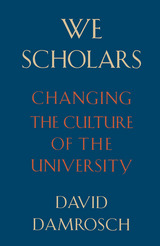
Never before have so many scholars produced so much work--and never before have they seemed to have so little to say to one another, or to the public at large. This is the dilemma of the modern university, which today sets the pattern for virtually all scholarship. In his eloquent book, David Damrosch offers a lucid, often troubling assessment of the state of scholarship in our academic institutions, a look at how these institutions acquired their present complexion, and a proposal for reforms that can promote scholarly communication and so, perhaps, broader, more relevant scholarship.
We Scholars explores an academic culture in which disciplines are vigorously isolated and then further divided into specialized fields, making for a heady mix of scholarly alienation and disciplinary territorialism, a wealth of specialized inquiry and a poverty of general discussion. This pattern, however, is not necessary and immutable; rather, it stems from decisions made a century ago, when the American university assumed its modern form. Damrosch traces the political and economic assumptions behind these decisions and reveals their persisting effects on academic structures despite dramatic changes in the larger society. We Scholars makes a compelling case for a scholarly community more reflective of and attuned to today's needs. The author's call for cooperation as the basis for intellectual endeavor, both within and outside the academy, will resonate for anyone concerned with the present complexities and future possibilities of academic work.
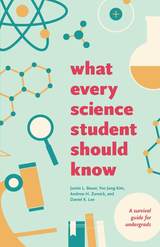
In 2012, the White House put out a call to increase the number of STEM graduates by one million. Since then, hundreds of thousands of science students have started down the path toward a STEM career. Yet, of these budding scientists, more than half of all college students planning to study science or medicine leave the field during their academic careers.
What Every Science Student Should Know is the perfect personal mentor for any aspiring scientist. Like an experienced lab partner or frank advisor, the book points out the pitfalls while providing encouragement. Chapters cover the entire college experience, including choosing a major, mastering study skills, doing scientific research, finding a job, and, most important, how to foster and keep a love of science.
This guide is a distillation of the authors’ own experiences as recent science graduates, bolstered by years of research and interviews with successful scientists and other science students. The authorial team includes former editors-in-chief of the prestigious Dartmouth Undergraduate Journal of Science. All have weathered the ups and downs of undergrad life—and all are still pursuing STEM careers. Forthright and empowering, What Every Science Student Should Know is brimming with insider advice on how to excel as both a student and a scientist.
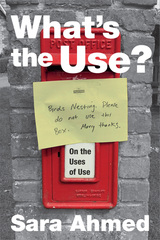
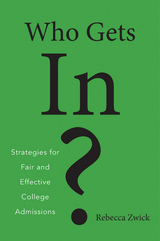
When it comes to the hotly disputed topic of college admissions, the one thing everyone agrees about is that it’s unfair. But there is little agreement on what a fair process would be.
Rebecca Zwick takes a hard look at the high-stakes competition of U.S. college admissions today. Illustrating her points using analyses of survey data from applicants to the nation’s top colleges and universities, she assesses the goals of different admissions systems and the fairness of criteria—from high school grades and standardized test scores to race, socioeconomic status, and students’ academic aspirations. The demographic makeup of the class and the educational outcomes of its students can vary substantially, depending upon how an institution approaches its task. Who Gets In? considers the merits and flaws of competing approaches and demonstrates that admissions policies can sometimes fail to produce the desired results. For example, some nontraditional selection methods can hurt more than help the students they are intended to benefit.
As Zwick shows, there is no objective way to evaluate admissions systems—no universal definition of student merit or blanket entitlement to attend college. Some schools may hope to attract well-rounded students, while others will focus on specific academic strengths. What matters most is that a school’s admissions policy reflects its particular educational philosophy. Colleges should be free to include socioeconomic and racial preferences among their admissions criteria, Zwick contends, but they should strive for transparency about the factors they use to evaluate applicants.
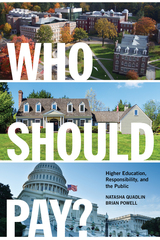
Who Should Pay? draws on a decade’s worth of public opinion surveys analyzing public attitudes about whether parents, students, or the government should be primarily responsible for funding higher education. Quadlin and Powell find that between 2010 and 2019, public opinion has shifted dramatically in favor of more government funding. In 2010, Americans overwhelming believed that parents and students were responsible for the costs of higher education. Less than a decade later, the percentage of Americans who believed that federal or state/local government should be the primary financial contributor has more than doubled. The authors contend that the rapidity of this change may be due to the effects of the 2008 financial crisis and the growing awareness of the social and economic costs of high levels of student debt. Quadlin and Powell also find increased public endorsement of shared responsibility between individuals and the government in paying for higher education. The authors additionally examine attitudes on the accessibility of college for all, whether higher education at public universities should be free, and whether college is worth the costs.
Quadlin and Powell also explore why Americans hold these beliefs. They identify individualistic and collectivist world views that shape public perspectives on the questions of funding, accessibility, and worthiness of college. Those with more individualistic orientations believed parents and students should pay for college, and that if students want to attend college, then they should work hard and find ways to achieve their goals. Those with collectivist orientations believed in a model of shared responsibility – one in which the government takes a greater level of responsibility for funding education while acknowledging the social and economic barriers to obtaining a college degree for many students. The authors find that these belief systems differ among socio-demographic groups and that bias – sometimes unconscious and sometimes deliberate – regarding race and class affects responses from both individualistic and collectivist-oriented participants.
Public opinion is typically very slow to change. Yet Who Should Pay? provides an illuminating account of just how quickly public opinion has shifted regarding the responsibility of paying for a college education and its implications for future generations of students.
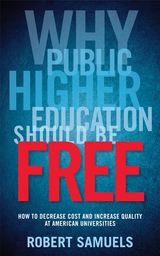
In Why Public Higher Education Should Be Free, Robert Samuels argues that many institutions of higher education squander funds and mislead the public about such things as average class size, faculty-to-student ratios, number of faculty with PhDs, and other indicators of educational quality. Parents and students seem to have little knowledge of how colleges and universities have been restructured over the past thirty years.
Samuels shows how research universities have begun to function as giant investment banks or hedge funds that spend money on athletics and administration while increasing tuition costs and actually lowering the quality of undergraduate education. In order to fight higher costs and lower quality, Samuels suggests, universities must reallocate these misused funds and concentrate on their core mission of instruction and related research.
Throughout the book, Samuels argues that the future of our economy and democracy rests on our ability to train students to be thoughtful participants in the production and analysis of knowledge. If leading universities serve only to grant credentials and prestige, our society will suffer irrevocable harm. Presenting the problem of how universities make and spend money, Samuels provides solutions to make these important institutions less expensive and more vital. By using current resources in a more effective manner, we could even, he contends, make all public higher education free.
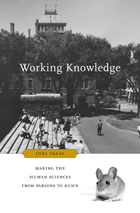
The human sciences in the English-speaking world have been in a state of crisis since the Second World War. The battle between champions of hard-core scientific standards and supporters of a more humanistic, interpretive approach has been fought to a stalemate. Joel Isaac seeks to throw these contemporary disputes into much-needed historical relief. In Working Knowledge he explores how influential thinkers in the twentieth century's middle decades understood the relations among science, knowledge, and the empirical study of human affairs.
For a number of these thinkers, questions about what kinds of knowledge the human sciences could produce did not rest on grand ideological gestures toward "science" and "objectivity" but were linked to the ways in which knowledge was created and taught in laboratories and seminar rooms. Isaac places special emphasis on the practical, local manifestations of their complex theoretical ideas. In the case of Percy Williams Bridgman, Talcott Parsons, B. F. Skinner, W. V. O. Quine, and Thomas Kuhn, the institutional milieu in which they constructed their models of scientific practice was Harvard University. Isaac delineates the role the "Harvard complex" played in fostering connections between epistemological discourse and the practice of science. Operating alongside but apart from traditional departments were special seminars, interfaculty discussion groups, and non-professionalized societies and teaching programs that shaped thinking in sociology, psychology, anthropology, philosophy, science studies, and management science. In tracing this culture of inquiry in the human sciences, Isaac offers intellectual history at its most expansive.
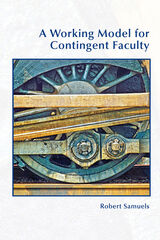
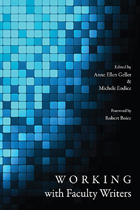
Contributors from a variety of institution types and perspectives consider who faculty writers are and who they may be in the future, reveal the range of locations and models of support for faculty writers, explore the ways these might be delivered and assessed, and consider the theoretical, philosophical, political, and pedagogical approaches to faculty writing support, as well as its relationship to student writing support.
With the pressure on faculty to be productive researchers and writers greater than ever, this is a must-read volume for administrators, faculty, and others involved in developing and assessing models of faculty writing support.
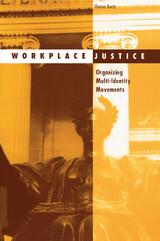
An unheralded union battle offers new insight into identity politics
In 1991, Columbia University’s one thousand clerical workers launched a successful campaign for justice in their workplace. This diverse union-two-thirds black and Latina, three-fourths women-was committed to creating an inclusive movement organization and to fighting for all kinds of justice. How could they address the many race and gender injustices members faced, avoid schism, and maintain the unity needed to win? Sharon Kurtz, an experienced union activist and former clerical worker herself, was welcomed into the union and pursued these questions. Using this case study and secondary studies of sister clerical unions at Yale and Harvard, she examines the challenges and potential of identity politics in labor movements.
With the Columbia strike as a point of departure, Kurtz argues that identity politics are valuable for mobilizing groups, but often exclude members and their experiences of oppression. However, Kurtz believes that identity politics should not be abandoned as a component in building movements, but should be reframed-as multi-identity politics. In the end she shows an approach to organizing with great potential impact not only for labor unions but for any social movement.
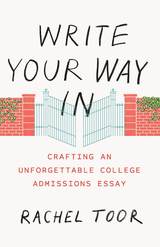
The good news? You already have the “secret sauce” for crafting a compelling personal essay: your own experiences and your unique voice.
More than twenty million students apply to college every year; many of them look similar in terms of test scores, grades, courses taken, extracurricular activities. Admissions officers wade through piles of files. As an applicant, you need to think about what will interest an exhausted reader. What can you write that will make her argue to admit you instead of the thousands of other applicants?
A good essay will be conversational and rich in vivid details, and it could only be written by one person—you. This book will help you figure out how to find and present the best in yourself. You’ll acquire some useful tools for writing well—and may even have fun—in the process.
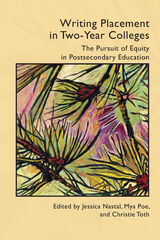
READERS
Browse our collection.
PUBLISHERS
See BiblioVault's publisher services.
STUDENT SERVICES
Files for college accessibility offices.
UChicago Accessibility Resources
home | accessibility | search | about | contact us
BiblioVault ® 2001 - 2024
The University of Chicago Press









